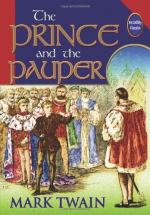Tom stammered a moment, in a pathetic confusion, then got it out—
“To crack nuts with!”
Poor child, the avalanche of laughter that greeted this nearly swept him off his feet. But if a doubt remained in any mind that Tom Canty was not the King of England and familiar with the august appurtenances of royalty, this reply disposed of it utterly.
Meantime the sumptuous robe of state had been removed from Tom’s shoulders to the King’s, whose rags were effectually hidden from sight under it. Then the coronation ceremonies were resumed; the true King was anointed and the crown set upon his head, whilst cannon thundered the news to the city, and all London seemed to rock with applause.
Chapter XXXIII. Edward as King.
Miles Hendon was picturesque enough before he got into the riot on London Bridge—he was more so when he got out of it. He had but little money when he got in, none at all when he got out. The pickpockets had stripped him of his last farthing.
But no matter, so he found his boy. Being a soldier, he did not go at his task in a random way, but set to work, first of all, to arrange his campaign.
What would the boy naturally do? Where would he naturally go? Well —argued Miles—he would naturally go to his former haunts, for that is the instinct of unsound minds, when homeless and forsaken, as well as of sound ones. Whereabouts were his former haunts? His rags, taken together with the low villain who seemed to know him and who even claimed to be his father, indicated that his home was in one or another of the poorest and meanest districts of London. Would the search for him be difficult, or long? No, it was likely to be easy and brief. He would not hunt for the boy, he would hunt for a crowd; in the centre of a big crowd or a little one, sooner or later, he should find his poor little friend, sure; and the mangy mob would be entertaining itself with pestering and aggravating the boy, who would be proclaiming himself King, as usual. Then Miles Hendon would cripple some of those people, and carry off his little ward, and comfort and cheer him with loving words, and the two would never be separated any more.
So Miles started on his quest. Hour after hour he tramped through back alleys and squalid streets, seeking groups and crowds, and finding no end of them, but never any sign of the boy. This greatly surprised him, but did not discourage him. To his notion, there was nothing the matter with his plan of campaign; the only miscalculation about it was that the campaign was becoming a lengthy one, whereas he had expected it to be short.
When daylight arrived, at last, he had made many a mile, and canvassed many a crowd, but the only result was that he was tolerably tired, rather hungry and very sleepy. He wanted some breakfast, but there was no way to get it. To beg for it did not occur to him; as to pawning his sword, he would as soon have thought of parting with his honour; he could spare some of his clothes—yes, but one could as easily find a customer for a disease as for such clothes.




